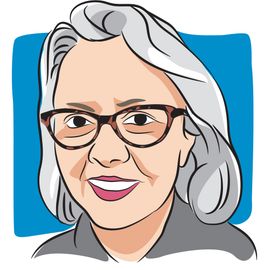- About Us
- Advertise / Support
- Editorial Board
- Contact Us
- CancerNetwork.com
- TargetedOnc.com
- OncLive.com
- OncNursingNews.com
- Terms & Conditions
- Privacy
- Do Not Sell My Information
- Washington My Health My Data
© 2025 MJH Life Sciences™ and CURE - Oncology & Cancer News for Patients & Caregivers. All rights reserved.
A Cancer Portrait Hidden in the Attic of My Mind

Felicia Mitchell, retired from college teaching, is a poet and writer who makes her home in southwestern Virginia. She is a survivor of stage 2b HER2-positive breast cancer diagnosed in 2010. Website: www.feliciamitchell.net
A breast cancer survivor reflects whimsically on how she might have aged with two breasts instead of one.
As Breast Cancer Awareness Month, also the anniversary of my mastectomy, arrived, I had a strange thought. What would my right breast be like now if it had not been removed? Thoughts flicker into our minds, so I let this one flit. Then I pondered why this thought was bubbling up from my subconscious mind.
When I was in tenth grade, I wrote a book report on Oscar Wilde’s “The Portrait of Dorian Gray.” Creative teenager that I was, I wrote in the voice of the portrait hidden in the attic, aging as its subject — Dorian Gray — remained youthful. This report, which I still have, is the first thing that popped into my mind when I began to feel whimsical about my missing breast.
That is because, thanks to modern medicine including chemotherapy, radiation and a monoclonal antibody, I get to age. Unlike Dorian Gray, though, I love getting old(er) by the year. The human body is a magical place to reside, especially after surviving cancer makes you value it more. I watch my skin change, my eyes, my hair, the veins in my legs. With medical monitoring, I sometimes get a peek inside the infrastructure that keeps me going. I am definitely aging.
When some women age, their breasts droop. Mine does. In fact, it has become more noticeable with age, this lone asymmetrical breast I am satisfied with. A few more times a year, however, I find myself reaching for the prosthesis-embedded mastectomy bra when I wear certain outfits. Whereas I used to wear the prosthesis maybe once a year, if that, I have worn it four times this year.
What does that fashion choice mean? Do I long for a youthful (now aging) body that has two breasts? Why do I opt for an uncomfortable few hours to look like what I might have looked like without cancer? Tending to overthink most decisions, I have learned to talk back to such questions to understand the psychological reasons underneath them.
Losing a breast is nothing in the grand scheme of things, I realize, but with my fanciful mind, it makes sense to wonder how it would have aged. For example, my right breast was smaller than my left. What would gravity have done to it? Would it ever have matched its mate? Truly, I admit, it may not be my right breast I am really thinking about. I know my mind. Deep down, I believe, I must be missing that innocence we have before cancer: the “before” days, when we trust our bodies never to falter.
Sometimes I wish I could go to sleep and wake up with the usual health challenges that come with age as well as with a body that never knew breast cancer or the side effects it has bequeathed to me. Sometimes I wonder if wearing a prosthesis is my way of pretending I never had cancer, the body I present to the world contrasting with the portrait of a woman with cancer locked away in my mental attic for a day. Cancer invites the strangest musings, right? Fortunately, I accept reality with help from my rational brain.
Felicia Mitchell is a survivor of stage 2b HER2-positive breast cancer diagnosed in 2010.
This piece reflects the author’s personal experience and perspective. For medical advice, please consult your health care provider.
For more news on cancer updates, research and education, don’t forget to subscribe to CURE®’s newsletters here.
Related Content:



